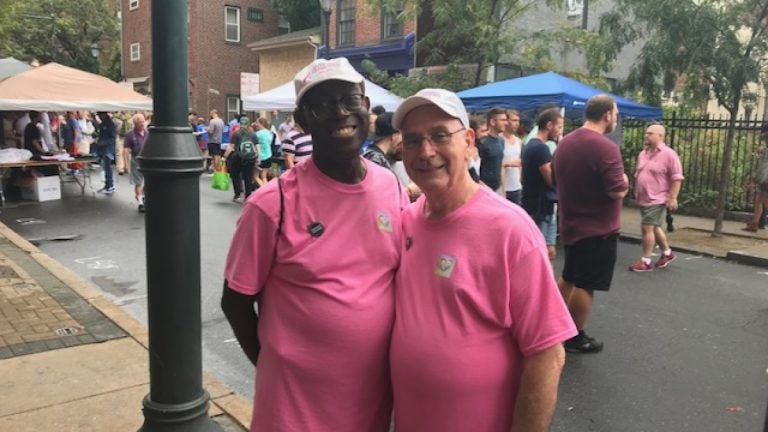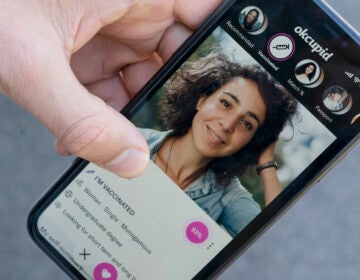At Philly’s Outfest, Sessions order eroding LGBT protections widely panned
U.S. Attorney General Jeff Sessions issues directive allowing businesses, nonprofits, and others claiming "religious liberty" to deny jobs or services to LGBT community.

Stevie, left, and Arthur Martin-Chester have been married since 2013 when Montgomery County, Pa. officials defied state and federal law by issuing same-sex marriage licenses. (Shai Ben-Yaacov, WHYY)
A man with a bullhorn stood on a riser at the corner of 12th and Locust streets, the heart of Philadelphia’s Gayborhood, preaching Sunday to the largely rainbow-clad festival-goers around him.
“We don’t want you to die in sin,” he said. “We want you to be set free.”
Most people ignored him.
But the street-corner preacher’s presence in the midst of Outfest — an annual block party in honor of National Coming Out Day that was expected to draw 40,000 attendees this year — highlighted an issue that raised concerns among LGBT advocates late last week.
On Friday, U.S. Attorney General Jeff Sessions issued a directive to federal agencies that would allow businesses, nonprofits, and other entities that claim “religious liberty” to deny jobs or services to the LGBT community, women, and other groups.
Like most at the festival, Emily Ranieri didn’t support that position.
“Religion is a hot-button topic, of course,” she said. “Me, personally, I don’t believe in it, but for people who do, that is your right. However, when it affects others in the sense of discrimination, then that is not OK to me.”
“The whole issue upsets me because I really don’t like the idea of people claiming that it’s a religious objection or a moral objection when, really, they just simply don’t like LGBT people,” said Ray Simon.
Tom Medina-Castrejon said he believes there would be no debate if the situation were reversed.
“There would be an outrage if someone was like, ‘Oh, well you’re wearing a cross necklace, so I’m not going to treat you in my office or I’m not going to whatever.’ So I think it’s kind of a double standard,” he said.
Robin Renee said she buffers herself against discrimination by working for herself and living in what she described as an open-minded community.
“I am an entrepreneur, and I work for myself, and I’ve made the decision early in life to come out as a bi-person and as a queer person,” she said. “So that I think I eliminate those things by just being visible, so if someone has an issue with me, they’re not going to deal with me.”
Down the block, Stevie and Arthur Martin-Chester were walking hand-in-hand, wearing matching pink hats and T-shirts. They were married in 2013 when Bruce Hanes, the Montgomery County register of wills, defied state and federal law by issuing marriage licenses to same-sex couples two years before the U.S. Supreme Court struck down the Defense of Marriage Act.
“We were No. 15 to get married,” Stevie remembered. “When we first got together 25 years ago, we always said we would marry. As you see, we dress alike. We hold hands everywhere, we hug and kiss everywhere, and people ask us, ‘Why do you do that?’ I said, ‘We’re Americans. It’s our right to do that.'”
Asked about Sessions’ new directive, Arthur had a somewhat surprising answer.
“I hate to say it as a gay person, but businesses do have the right to choose their clientele,” he said. “I think if a business is trying to do a service to a community then they should serve the whole community. So if you want to put up a sign that ‘I will only serve straight people,’ then that’s fine with you. But if you want to serve everyone, then you should be able to serve all people, LGBT people included.”
Arthur said the couple has not encountered serious discrimination because they never try to hide their sexual orientation.
“People see that we are who we are and they feel a positivity,” he said.
Besides, Stevie added, the couple has good lawyers.
WHYY is your source for fact-based, in-depth journalism and information. As a nonprofit organization, we rely on financial support from readers like you. Please give today.




